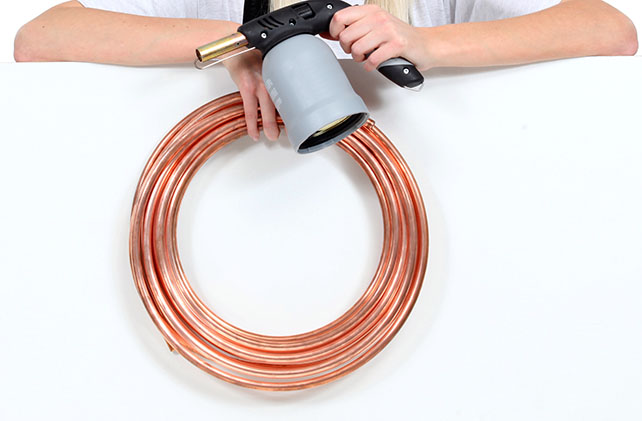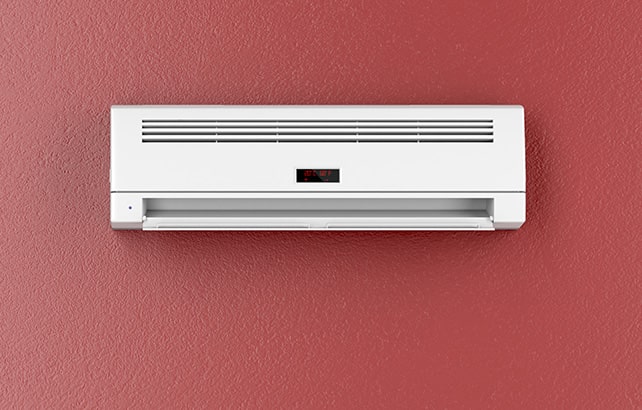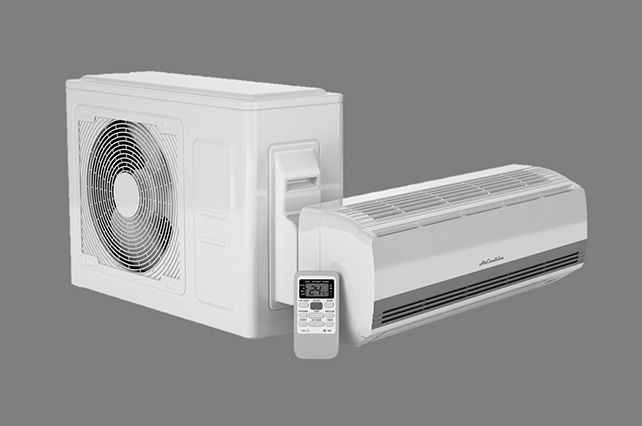Copper Coil vs Aluminium Coil: Which one is Best for your AC?
Shopping for air conditioners gets a lot more complicated once you start hearing about terms like copper coils and aluminium coils. If you do not have any technical experience with electrical appliances or household amenities, you might not be familiar with the differences between copper coil vs aluminium coils in ACs.
However, the type of coil in the air conditioner can make a significant difference in its overall performance. These Coil are usually a part of the condenser unit of the air conditioner, which is an important part of the unit that releases the heat absorbed from inside the room. The condenser coil also plays an important role in this process. Read on to learn more about whether you should choose a copper or aluminium or alloy coil.

Why are Coils used in AC and What Types of Coils are used?
Coils are an important part of AC condensers, along with compressors, fins, and the fan. There are two types of coils in an air conditioner unit – the condenser coil and the evaporator coil. The condenser coils are a part of the outer unit of split air conditioners which help distribute the heat from the indoor to the outdoor environment. The evaporator coil, on the other hand, serves to transform compressed cooling chemicals like Freon from liquid to gas, while absorbing the heat.
Naturally, every AC manufacturer will claim that their choice of coils is the best option. It is easy to trick to buyers who have never had a chance to learn more about these AC components. In fact, there are plenty of differences between copper coil vs aluminium coil and their alloy alternative. Therefore, you should know a thing or two about these components before making a purchase.
Since coils are located as a part of exterior unit in the air conditioner system, they need to be built to last for longer time. After all, the outer unit and coils of the AC get exposed to rain, sun, and all sorts of weather conditions. Thus, it is important that the coil is fully corrosion resistant and durable to withstand harsh conditions for years.
Materials Used in Making the Coils
There is an on-going debate about which material is the best choice for air conditioner coils. The question is whether you should choose copper or aluminium or alloy coils and why? Here’s a brief overview of the materials that AC coils are made of.
Copper
Copper is considered to be the material that was originally highly used to build AC condensers before alternatives such aluminium and alloy were brought into the game. As a material used for this purpose, copper also stands as the most durable option. While copper coils were the most efficient solution from the very beginning, manufacturers are trying to innovate with alternative materials to cut the costs of production.
Aluminium
Aluminium coils have always seemed like a great solution for saving money on condenser production. Manufacturers started using aluminium coils as an alternative to copper coils and also to cut back on expenses as well as the price of the product. However, they were met with a long list of challenges, from poor performance, low efficiency to even worse corrosion issues.
Alloy’s
Lastly, the aluminium alloy coils joined the game after innovators started searching for a new design that would be more corrosion resistant. As a result, the alloy coils increased the efficiency of the condenser by 10%, as well as brought some significant benefits such as lighter weight.
Copper Coil vs Aluminium Coil – Which One is Best and Why?
In this section, we are going to focus on the debate of which is better – copper condenser vs aluminium condenser. Make sure to keep these factors in mind when making your final decision.
Price
We will start off with the pricing aspect since the budget is often one of the key factors for determining a purchase decision. With copper being more expensive in its simplest form, it costs more to build a copper condenser for an AC compared to an aluminium one. Therefore, a copper condenser air conditioner is likely going to cost more on the market.
Aluminium coils are the cheaper alternative, as air conditioners with aluminium coils are significantly less expensive. On top of that, aluminium is easy to bend and parts of it can be repurposed, which means it takes significantly less aluminium material to create the coils.
Bottom line: Copper is more expensive than aluminium, hence air conditioners with copper coils are pricier than those with aluminium components.
Corrosion Resistance
Corrosion is one of the most important factors in determining the quality of an air conditioner condenser. It is important to protect the condenser from corrosion in order to lengthen the lifespan of the AC. Between copper coil vs aluminium coil, the answer to which material is more corrosion resistant is simply copper.
However, both copper and aluminium can corrode in high humidity conditions. Aluminium is highly prone to corrosion than copper and it corrodes mainly at the joints and often faster. Also aluminium is a lot more difficult to repair in such a situation.
Coming to copper, it is very less corrosive and is highly resistant to several organic chemicals as well. But a green platina can form on the copper if it is exposed to the atmosphere for a longer time even then it doesn’t affect the copper much.
Bottom line: Copper is highly corrosion resistant than aluminium, which makes it the best choice to go ahead. Even alloy coils are more corrosion resistant than aluminium ones.
Cooling Ability
Once again, copper takes the win because copper coils have a higher cooling ability compared to both aluminium and alloy alternatives. Coils are an essential part of the condenser because the heat transfer which is the most important process in an air conditioner that takes place within the coils.
Copper naturally has more favorable heat transfer characteristics and it shows far more efficiency compared to aluminium. Being a better heat exchanger, copper makes the air conditioner more efficient and thus higher in quality.
Bottom line: When it comes to the cooling ability, copper is the better coil material because it transfers heat more efficiently and thus benefits the entire cooling process.
Durability
Coming to the durability, Aluminium is less durable than copper and thus more likely to malfunction after a while.
On top of that, copper coils can be repaired easily in case something goes wrong. Aluminium ones, on the other hand, are not easy to fix. If an aluminium coil goes bad, it will need replacement. Therefore, copper is not only a more durable choice but also a more reliable one.
Bottom line: Copper emerges as the more durable material for condenser coils because it is less likely to corrode and it can be repaired in case of any issues.
Leak proof
Gas leaks are a serious concern when it comes to AC condensers. Between copper coil vs aluminium coil in AC, copper is more leak proof and thus more secure to use.
While copper coils may leak in some situations, they are easy to repair. However, due to high corrosion risk, aluminium is a lot more likely to cause gas leaks that are not only frequent but also irreparable.
Bottom line: While neither aluminium nor copper is fully leak proof, copper is a safer choice because it is more durable and long lasting.
Heat Transfer
The modern copper condensers are more efficient at heat transfer compared to both alloy and aluminium alternatives. That is thanks to copper tubes designed with riffling inside.
This kind of design increases the surface area of the tube and thus increases heat transfer efficiency. Aluminium is naturally a poorer heat exchanger, which makes it a less efficient choice for air conditioner condensers.
Bottom line: Copper air conditioner coils are a better choice for heat transfer efficiency because copper is naturally a better heat exchanger compared to aluminium.
Pliability
Pliability is a property of a material to bend easily, under this factor copper again takes the upper hand as aluminium bends easily. Bending is not a very positive feature because it makes the coils less durable and less efficient.
While copper is naturally stronger, manufacturers sometimes create thinner copper coils on purpose to cut the expenses. These thinner coils are less durable and more likely to bend. Therefore, you should be aware of these practices when making the purchase.
Bottom line: Even though copper is usually more durable and less pliable, low quality copper coils can be bent like aluminium ones. Look into the coil quality before making a purchase.
Ease of Maintenance
As a part of the outer AC unit, coils are usually exposed to harsh weather conditions. Thus, you should maintain them regularly to avoid corrosion and related issues.
Copper coils are generally easier to clean and maintain in the long run because of their exceptional durability. Since aluminium coils are less durable, they are usually kept in heavy protective containers to prevent damage. This can make maintenance a bit more challenging.
Bottom line: Copper coils are easier to maintain because they are more durable than aluminium ones and they are also more easily accessible within the unit.
Repair
Last but not least, you should keep in mind that aluminium coils are extremely difficult to repair. In most cases, you will have to get a replacement in case of corrosion.
Copper coils, on the other hand, stand a chance at repairs, which makes them a more reliable solution for air conditioner condensers.
Bottom line: Aluminium coils are definitely not easy to repair. In most situations, you will need a replacement because simple fixes won’t make much of a difference.
Why Copper Coils are More Preferred than Aluminium Coils and Alloy in Split AC’s ?
As you can see from the long list of factors above, copper is definitely the winner when compared with other condenser coil materials. If you compare copper coils vs aluminium coils or even the alloy ones, you can clearly see the difference in quality and efficiency.
Copper coils are not only better at transferring heat but they are also stronger, more durable, and easier to maintain and repair without needing a replacement. Overall, copper coils are always the number one choice when it comes to purchasing air conditioners.
Be aware of Hybrid Coils
If you are someone who does not have a lot of technical experience with air conditioners, you probably won’t look too much into condenser coils and other technical components. Manufacturers often take advantage of such buyers because they can easily get away with selling hybrid coils.
Hybrid coils are coils made of hybrid materials, that is, usually a mixture of copper and other cheaper components. Manufacturers practice these tricks to cut down on production expenses and save money. However, such practices can compromise the quality of the overall air conditioner. Therefore, make sure to look out for such tricks and always check whether the coils are made of 100% copper.
Can I Replace an Existing Aluminium Coil of an AC with a Copper One?
While it is possible to replace an aluminium coil with a copper one, it is not the best practice to do unless you absolutely have to. After all, replacing the coils is one of the most significant repair procedures for an AC.
If you opt for such a repair, make sure an experienced professional handles the job. It is a much better option to choose an AC with copper coils from the start so you don’t have to spend money on additional changes and repairs. If it comes down to it, it is possible to replace aluminium coils for copper ones, as long as you have a professional by your side.
How to Select a Good Copper Coil for AC?
The more fins per inch the copper coil has, the more efficient it will be at transferring the heat. Therefore, you should look for a high quality copper coil with at least 8 to 10 fins per inch to get a good heat transfer result. The thicker the coil, the high quality it is.
How to Select a Good Aluminium Coil?
We highly recommend sticking to copper coils when choosing an air conditioner simply because copper wins every single comparison to aluminium.
If you have the budget to spend a bit of extra money on the higher quality copper coils instead of aluminium ones, you will save yourself a lot of trouble in the future. However, if you opt for the cheaper alternative and decide to stick to aluminium, go for the ACs with thick aluminium coils.
How Much Do Copper and Aluminium Coils for AC Cost?
We have already established that copper is more expensive than aluminium because it is higher in quality and also more efficient at transferring heat. Therefore, if you want to get more value for your money, opt for the higher quality option instead of the cheap alternative.
A meter of copper coils usually costs around 600 to 800 Indian rupees, whereas you can get a meter of aluminium for less than 600 rupees. However, keep in mind that these prices can fluctuate and differ depending on brands and vendors you are looking at. As always, make sure to check the quality and authenticity of the materials before making a purchase.
Summary
This marks the end of our comparison between copper coil vs aluminium coil. We’ve discussed the purpose of coils in air conditioner condensers, as well as the differences between these two materials and alloy as the third alternative. To conclude, copper emerges as the highest quality option because of its durability and high heat transfer capabilities.
Aluminium, on the other hand, is less reliable since it cannot be repaired and it usually requires replacement in case of corrosion. Speaking of which, neither alloy, aluminium, not copper coils are corrosion resistant. However, copper coils are way less likely to corrode because they are more durable and easier to maintain. Make sure to keep this information in mind when choosing your new air conditioner.




